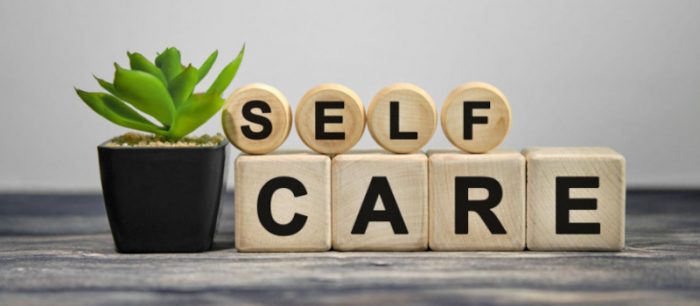Let’s Practice Self-Care During Service and Beyond

As Peace Corps Volunteers (PCVs), we get so focused on our work and on helping others that we sometimes forget about taking care of ourselves. But it is important to practice self-care too. We all need to show ourselves some TLC so that we can be at our best for others.
In a nutshell, self-care means taking care of your own wellbeing. Create some comfort when things are not comfortable. Learn how to relax and release stress. But the way people practice self-care is very individual. What works for one person or situation may not work for the next.
RPCV Health Crusade collected these tips from RPCVs and other resources. Even though these are targeted to help PCVs during Peace Corps service, these tips could also be helpful for any of us at any point in our lives. And as usual, consult with your medical professionals on the best ways for you to practice self-care especially if you have health concerns.
Eat Well
When you are trying out new foods, give your body a chance to adjust. Start with lighter portions to see how your body reacts and digests it. Don’t try too many new foods or spices at once so that it is easier to pinpoint what doesn’t agree with you or what you may have an allergy to.
Learn how to eat healthy and safely during service. Start your research early on what foods are available in your service country. Find a restaurant or grocery option with the cuisine of that county. Just know that it may not be exactly the same as the food you find in country. This also gives you a chance to learn about any new food allergies before you start your Peace Corps service.
Drink Plenty of Water

Keep your body hydrated. Create a routine to make sure you drink enough water every day. Make sure you have access to safe drinking water during service. In some service countries, it is safe to drink water from the tap. But in some countries, it is not. If you don’t have adequate amounts of clean drinking water at your service location, work with the Peace Corps Medical Officer (PCMO) to make sure that you do.
If you are in a hot environment, you may sweat more which means you need to drink even more water. In dry desert environments, you may not realize you are sweating. Make drinking water a part of your daily routine as soon as you can. Start making it a habit before you arrive in your service country.
Bring a reusable water bottle to your service country. Pick one that that is easy to clean inside and out. And, select one that is durable. Expect that water bottle to be dropped, hit, or squished into your bag on a regular basis.
Develop a Physical Workout Routine
You may not have access to a gym but that doesn’t mean you can’t have a workout routine. Can you tuck a few resistance bands into your luggage? Do you have supportive shoes to work out in? Be sure you can do your routine in a safe manner. The nearest medical facility could be hours away so pay attention to pain and injuries.
And be mindful of what the Host Country Nationals (HCNs) wear. Be sensitive to the culture. If they dress very modestly, then it might not be the best idea to go jogging around the area in a tank top and short shorts. If no one else wears skin-tight clothes for a workout, then should you wear that leotard in the front yard in a downward dog pose?
Get Sufficient Rest

It may take some time to develop a regular sleep schedule. Give your body time to adjust to a new time zone or unfamiliar sleep settings. Once you settle into a sleep schedule, be sure to get sufficient deep sleep time.
Many PCVs give so much of ourselves even if it means giving up some sleep. Sometimes we take on more than we can handle. If you start to feel burnt out, take a break and get some rest. Most people are more tolerant when they are well rested. So, grab those Zs and make them count.
Take Care of Your Body
Get some natural vitamin D through a daily dose of sunlight. But re-apply suntan lotion frequently when you are in the sun.
Pamper your body. If you are on your feet all day, a quick foot massage can make a world of difference. A good stretch can release some tense muscles. If you can, linger for a while during bath time. But if you are in an area where water or tubs are scarce, then a nice foot bath can be refreshing too.
Understand your body. Pay attention to scars or bruises that are slow to heal. If your skin always feels dry, what does that mean? If you are having trouble focusing, how can you better organize your thinking?
Find Ways to Decompress
Often Peace Corps service is like being in a fishbowl. HCNs are often watching you with curiosity. You are in full view. But some PCVs need time to be on our own to decompress. If this is you, schedule yourself some private down time. Find a quiet private space. Write in your journal. Or, turn on some music and dance it out. Look for ways to release that stress.
And if you are feeling isolated and need to interact with others, reach out to other PCVs. They know what you are going through better than your friends and family at home. Share your experiences and tips. You can learn a lot from each other. You don’t need to learn everything the hard way.
Just be careful about venting to your HCN counterparts or host families. Some words and actions don’t translate well across cultures. You may not mean to offend but it could still happen.
And be mindful that even when you think you are only interacting with other PCVs or your US friends, HCNs can still hear and see you. PCVs may not write letters and postcards anymore but did you leave the computer on or your phone unlocked? Can your host family hear you when you are talking with other PCVs? You created that online blog to keep your family and friends updated but are HCNs also reading it?
Treat Yourself Once In A While

You don’t have to suffer in order to serve. Give yourself a treat once in a while. Find things that you like to do, see, hear, eat, or think about. Put it on your calendar or work it into your routine. Give yourself something to look forward to.
Treats don’t have to be lavish, expensive, or full of empty calories. It can be just for you or include others. Treats can also be something simple but meaningful to you. But if that dark chocolate helps to put you in a good mood, then why not? To some, a good workout, time with your adopted puppy, or a favorite book can be a treat. Look for things all around you that can be a treat for you.
Find Ways to Practice Self-Care
Peace Corps service can be challenging at times. So take the time to care for yourself too. And life after Peace Corps can be just as challenging. So let’s find ways to continue to practice self-care long after service.
And let us know if you have other tips and tricks that helps the next generation of PCVs. RPCVs are great at learning and sharing. Let’s keep doing that!
Share your tips and tricks to help PCVs stay healthy and better navigate service. And many of these great tips can be helpful in our lives after service too.